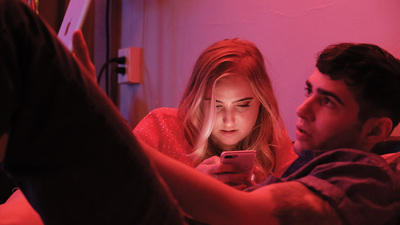
With app streaming services taking over the global computer market, it seems only right that artists will parody the rise of such automation of our youth culture in the face of past human emotionality. Director and writer Dana Nachman takes the reigns on her film about the criticism of such applications and with a touch of feminist influences, creates a film that both denounces and praises the current polemic of youth culture in modern society. What audiences have here is a scathing look at the superficiality of even sexual intercourse all within the guise of a college dorm party, with actors Veronica Dunne and Billy Meade providing viewers with the prototypical young lovers. Nachman’s screenwriting places the subjectivity of the audience in the standpoint of a distant perspective, not letting audiences know or learn about the protagonists. Everything is at a distance except for the tight angle camera shots, but the film’s director wants it that way. With a minimalist plot, unobtrusive soundtrack, and vane protagonists Hook Up 2.0 is a pleasant yet mediocre attempt at criticizing everything the millennial generation supposedly stands for, and film’s lackluster visuals and vague dialogue dampens this sociological expose on current youth trends in America.Â
A Lackluster Plot Equals The Lackluster Exposition
Just because a film is shot on a shoestring budget does not necessarily mean it is going to be lackluster in its intrinsic qualities. But Nachman’s attempt at a meta-cinematic experience bears no exception to this point. Hook Up 2.0 is not necessarily a poor film, in fact, it has many instances where the plot is propelled brilliantly by its young lovers. The metaphor of the V5 application as a meter to judge the value of a sexual experience magnificently exposes the superficiality of the computerized generation that arose during the Apple domination of the global market. There were many times during this film that one instantly sees the political consternation of the modern world, and in many ways, it praises its power balance between men and women. The fact that the female lead character chooses to use her phone’s V5 application to judge the quality of her sexual experience before engaging in the act represents the feminine stance the director praises of the current youth psyche. In this film, the female protagonist is the focal point of the plot and her decisions to walk away from having meaningless and unsubstantive sex with her college cohort emphasizes the direction in which the film’s creator intends on pivoting towards. But the film’s overall meanderings and nonsensical dialogue hinder this from becoming a true gem of a political statement.
The Subtext Does Not Equal The Context
In the end, a film is truly judged by its quality in preproduction and how well it comes full circle to the final product. Keeping this instance in mind, Hook UP 2.0 fails in many ways to capture everything that independent cinema aims to achieve. The setting of a college dorm party seems interesting at first, and the camera work by cinematographer Dominique Martinez is brilliant with her use of tight angles and isometric camera positioning to represent falsified entrapment. But the technological brilliance of a film cannot overcome its scripted limitations, and Nachman’s screenplay falls short in many ways to deliver a substantive political experience. For instance, the metaphor of the door closing right before the male and female characters are about to engage in sex could have been so much more in terms of increasing the subtextual elements of the production. The fact that Dunne and Meade argue briefly about keeping the door closed symbolizes immediately the boundaries between the old fashioned private quarters of sexual intercourse with the open-minded views on sexuality in the modern era. But the director/writer fails to expand further on these themes, and instead, ops for a mere brief touch upon these contrasting ideologies for the meanderings of the V5 application the female protagonist so persistently relies upon with her iPhone. Such derision of the vanity of computerizing every facet of modern life could have been shown ever more brightly had the director did away with the constant use of the female protagonist’s phone motif in place of other consternations of current youth culture. This soft take on a political and sociological cinema fails short to live up to the great works of past political filmmakers such as Jean-Luc Godard and everything that the French New Wave hoped to achieve with its left-leaning stances on society.Â
The Verdict
With everything that this film fails to achieve within its seven-minute run time, Hook Up 2.0 is still a delightful take on modern youth culture and all the emphasis it places on living by their cell phones. But that is just the point, without any depth or cadence to subtext, the film’s creators never fully realize the potential of the story’s reach nor the criticism it hopes to achieve. The plot feels like a mismatch of cliches and youthful meanderings that could have appeared in any Nicolodeon production. Rather than referring to past political directorial masters like Godard or Truffaut, Nachman is content on staying within the realm of poking fun at millennial culture rather than seeking to consternate its development. The highlight of this film came from its cinematography and lighting that evoked the vacant vibe of its characters with the use of dull lumination effects and simplistic camera technique. In the end, Hook Up 2.0 feels more like an echo than full-fledged consternation of modern society. With all its political aspirations, the film’s meek screenwriting fails to deliver on any of its aspirations and this is the main criticism of Nachman’s work. Not a horrible piece of political cinema nor subpar by any standards. A few glimpses into the realities of the modern predicament are not enough to justify the spotty production values of a filmmaker who seeks to expose much but answers little.


Leave a Reply